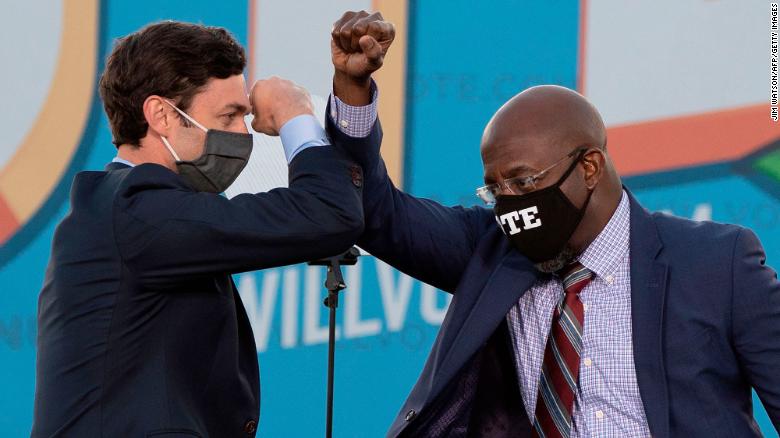Washington It was hard not to notice how Rev. Raphael Warnock and Jon Ossoff’s Democratic victories in Georgia’s January 5 runoff elections evoked the history of the Black freedom struggle — a continuing struggle, as evidenced by a Confederate flag-carrying mob’s takeover of the US Capitol on Wednesday.
“When I think about the arc of our history, what Georgia did (on Tuesday) is its own message in the midst of a moment in which so many people are trying to divide our country, at a time we can least afford to be divided,” Warnock told CNN’s John Berman on Wednesday morning on “New Day,” even before the assault on the US Capitol and multiracial democracy.
Insurrectionists — one person in a “Camp Auschwitz” shirt, so many others in MAGA hats — rioted in an attempt to block President-elect Joe Biden’s free and fair win. To the surprise of no one, a remarkably meager law enforcement presence treated the mob, brandishing White supremacist iconography, with the sort of humanity that was withheld from Black Lives Matter protesters last summer.
Warnock, who will be Georgia’s first Black senator and the first Black Democrat to represent a Southern state in the Senate, has been the senior pastor of Atlanta’s Ebenezer Baptist Church since 2005.
More specifically, the senator-elect is the senior pastor of the same church where Martin Luther King Jr., arguably the most well-known face and voice of the civil rights movement, preached from 1960 until his assassination in 1968.
Since King’s death, Ebenezer — beloved as “America’s Freedom Church” — has retained its centrality in the fight for racial equality.
The funerals of Hosea Williams, an activist who in 1965 helped lead some 600 marchers across Selma’s Edmund Pettus Bridge on Bloody Sunday, and Rayshard Brooks, a 27-year-old Black man who in June was fatally shot by Atlanta police, were held at Ebenezer.
“Rayshard Brooks is the latest high-profile casualty in the struggle for justice and a battle for the soul of America. This is about him, but it is so much bigger than him,” Warnock said in his eulogy. “This country has become too accustomed and comfortable with Black people dying.”
In addition, Ebenezer served as a kind of refuge following the shooting at the “Mother Emanuel” African Methodist Episcopal Church in Charleston, South Carolina, in 2015.
“Ebenezer is a place that people turn to in these moments of crisis in this city and the nation,” Warnock told The Atlanta Journal-Constitution in July. “People saw it as a place where they could bring their pain, and families saw it as a sanctuary for them in a time of need.”
The congressman and civil rights leader John Lewis, whose activism played a key role in the passage of the Voting Rights Act of 1965, worshipped at Ebenezer, and his funeral was held in the church’s hallowed halls after his passing last summer.
“It is a great honor to be back in Ebenezer Baptist Church, in the pulpit of its greatest pastor, Dr. Martin Luther King Jr., to pay my respects to perhaps his finest disciple — an American whose faith was tested again and again to produce a man of pure joy and unbreakable perseverance — John Robert Lewis,” former President Barack Obama said in his eulogy.
(On the topic of voting rights, it’s worthwhile to underscore that lawmakers designed Georgia’s runoff system with an intention to dilute Black voters’ political power, as historians note. And yet, despite such efforts, and thanks to indefatigable grassroots organizers, high Black voter turnout helped propel Warnock and Ossoff to victory.)
Not to be ignored: the fact that Ossoff’s triumph will make him Georgia’s first Jewish senator.
That a Black man and a Jewish man, both from the Deep South, are about to go to Washington as senators recalls a similar alliance from the civil rights era.
Consider that historians estimate that up to half of the White students who participated in Freedom Summer — the 1964 campaign to ramp up the number of registered Black voters in Mississippi — were Jewish.
On a more tragic note, Andrew Goodman and Michael Schwerner, two of the three Freedom Summer workers abducted and killed in the infamous 1964 Mississippi Burning case, were Jewish. James Chaney, the other worker, was Black.
Put another way, Black Americans and Jews share an important, though not always harmonious, historical bond, as the scholar Edward S. Shapiro writes in his 1994 essay, “Blacks and Jews Intertwined.”
It was this particular kinship that Warnock echoed on Wednesday morning, as he fit himself and Ossoff into history.
“We now represent the state of Georgia. I think Abraham Joshua Heschel — the rabbi who said when he marched with Dr. King, he felt like his legs were praying — I think he and Dr. King are smiling in this moment,” Warnock told CNN. “We hope to make them proud.”
>>>>

